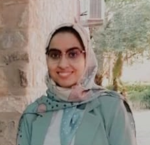Interview with Hafssa Ameziane on her choice to pursue a Ph.D. and her contribution to the ONCHIPS project
As a PhD candidate at CNRS-Saclay, do you consider yourself more as a student or a researcher? How do you like working at CNRS Saclay?
 As a PhD student, I consider myself more of a researcher than a student, primarily thanks to my involvement in the experimental scientific research. I take the initiative to propose new ideas and implement them as part of my thesis and I present my results at meetings and conferences. Hence, there are many aspects that I experience as a researcher that I wouldn’t have had the chance to explore as a student.
As a PhD student, I consider myself more of a researcher than a student, primarily thanks to my involvement in the experimental scientific research. I take the initiative to propose new ideas and implement them as part of my thesis and I present my results at meetings and conferences. Hence, there are many aspects that I experience as a researcher that I wouldn’t have had the chance to explore as a student.
Working at CNRS Saclay is a very pleasant experience for me. The working environment is excellent and I particularly appreciate the optimal conditions for conducting research.
What is your research topic? Why did you choose this domain?
My research topic is Growth of hexagonal crystal phase SiGe nanowires on m-plane substrates for integration of quantum electronics and photonics.
I chose this field because of my interest in research after my studies and internships in the materials field. I discovered that as a researcher in this field, you contribute to the discovery of new materials and the optimization of the properties of existing materials. This experience fascinated me deeply and inspired me to pursue a career in this field.
How do you like working on ONCHIPS project? In your opinion, what is exciting about this project? What/how your research work would contribute to it?
Working on the ONCHIPS project is truly fascinating, as it is a flagship project in the EU and worldwide. It brings together several crucial technologies and aims to provide a quantum technology based on an integrated architecture on silicon that combines static qubits (electronics) and spin qubits (photonics) on the same chip.
I see that my research work is an important part of the ONCHIPS project because I’m growing the hexagonal SiGe nanowires which is the platform used for combining these technologies.
Why/How did you decide to do a PhD?
Doing a PhD was my childhood dream, and after experiencing an academic career in the materials field, I discovered a strong passion for scientific research. My decision to embark on a PhD relates also to my future aspirations as a teacher-researcher.
What would be your advice for young women wishing to pursue their passion for a research career?
My advice to young women who wish to pursue their passion for a career in research is to believe in themselves and their skills. Establish a solid academic background, take on challenges, learn from failures. With passion, perseverance and a commitment to excellence, you can achieve your goals.
More recent news
 Tue 4 Nov 2025ONCHIPS AT THE 3RD INTERNATIONAL WORKSHOP ON HEXAGONAL SIGE AND RELATED MATERIALS
Tue 4 Nov 2025ONCHIPS AT THE 3RD INTERNATIONAL WORKSHOP ON HEXAGONAL SIGE AND RELATED MATERIALS Wed 30 Jul 2025Can you build a quantum computer from a single wire?
Wed 30 Jul 2025Can you build a quantum computer from a single wire? Fri 27 Jun 2025Workshop on Quantum Dot Spin Qubits in Budapest
Fri 27 Jun 2025Workshop on Quantum Dot Spin Qubits in Budapest Thu 12 Jun 2025Inspiring the next generation: Celeanum students visit the University of Twente
Thu 12 Jun 2025Inspiring the next generation: Celeanum students visit the University of Twente Wed 30 Apr 2025Interview with Anouk Somhorst, University of Twente
Wed 30 Apr 2025Interview with Anouk Somhorst, University of Twente


